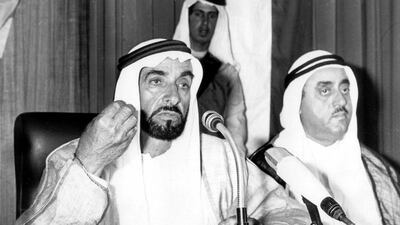This year marks the solemn 10th anniversary of the death of one of the 20th century's greatest leaders, the UAE's founding father, Sheikh Zayed bin Sultan Al Nahyan.
His leadership was always inclusive. Although Abu Dhabi had all the elements necessary to form a viable independent state on its own after the British withdrawal from the Gulf in 1971, he extended an invitation to form a greater Gulf union that he envisaged stretching from Bahrain to Ras Al Khaimah. He clearly saw the strength of such a federation – and more importantly, its potential.
More than 40 years on from the founding of the UAE, with the living proof of Sheikh Zayed’s vision evident all around us, we unfortunately continue to encounter voices of dissonance in the region: voices that doubt the viability of the most successful state in the Arab world.
The UAE considers the Arab Gulf as one homogeneous entity, so it is twice as hurtful that these people – our brothers – are attempting to sow dissent and incite factionalism within the federation.
Decades of effort and, to borrow from Churchill, blood, toil, tears and sweat, have been spent by multiple generations to make the UAE the reality it is today. This is the land of the diplomat martyrs Said Ghobash and Khalifa Al Mubarak; of the warrior martyrs Salim Suhail, who died in 1971 defending the now-occupied Greater Tunb Island from advancing Iranian forces, and of Lieutenant Tareq Al Shehhi whose killing earlier this year united all Bahraini factions in its condemnation, as well as the land of hundreds of soldiers who went on foreign deployment and peacekeeping missions from Kuwait to Kosovo, Bosnia, Somalia and Afghanistan.
In any country, there will always be dissenters and there are certainly aspects of life in the UAE that could be improved, but it is nothing short of dishonourable on the part of a tiny minority in the Gulf to try to stoke division between the citizens of the UAE. After more than 40 years of federation it is now impossible to differentiate between an Emirati from Sharjah or from Abu Dhabi, from Al Ain or from Ras Al Khaimah, Fujairah or Dubai. The clock cannot be turned back.
Over the past few weeks some of these nauseating voices on social media have used terms such as “the Coast of Oman” to refer to the present day UAE. Such cheap insults reflect only the pitiful state of these individuals. While historically the region’s territories have overlapped and names have been interchangeable, the spirit of the people of the Gulf has always been united and harmonious.
Individuals who try to turn Omanis against Emiratis, or Emiratis against each other, already have and will continue to fail miserably in their schemes. History is replete with examples of such sorry characters. Decades after the United States was founded, equally backwards individuals refused to recognise it as a reality, resulting in a terrible civil war in which good eventually triumphed over evil. If a few good men, including George Washington and Benjamin Franklin, in the face of many odds founded the USA, decades later the onus was on Abraham Lincoln and others to protect it. Similarly, if a few good men including Sheikh Zayed and Sheikh Rashid bin Saeed Al Maktoum, in the face of the odds, founded the UAE, decades later, the onus is on Sheikh Khalifa, Sheikh Mohammed bin Zayed and Sheikh Mohammed bin Rashid to protect it.
It seems all regional alliances understand the importance of unity except a certain dear member in the Gulf. In the Nato alliance, where an attack against one will be considered an attack against them all (Article 5), member states do not offer refuge and financial support to those who threaten other members. Asean’s Article 2, Principal 2B emphasises the respect for independence, sovereignty, equality, territorial integrity and national identity of all member states. Similar clauses can be found in the charters of other regional groups.
But can the GCC truly be certain that all its member states consider the security and integrity of other member states their top priority? There should be no room for doubt – but sadly there is. Our dear sister state in the Gulf can’t have its cake and eat it. It can’t support a renegade group with the left hand and greet us with the right. It can’t expect that if an editor is allowed to spew venom in his tweets and his articles day in and day out, we, the ordinary citizens of the UAE, will simply shrug our shoulders and ignore his insults.
Of course, such vile drivel on social media will not have a real effect on the UAE and is nothing but a sad reflection on the fact that a tiny minority of our close friends and family in the Gulf tolerate Twitter snakes in their midst and allow them to continue to spew venom about the UAE.
There is no difference in the UAE between an Al Nahyan or an Al Qasimi, an Al Maktoum or an Al Sharqi, a Suwaidi, Al Mualla, Nuaimi, Zarooni, Bloushi. We are one. This house stands united.
Sultan Sooud Al Qassemi is a commentator on Arab affairs
On Twitter: @SultanAlQassemi

